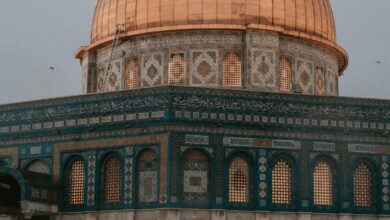Višegrad: Back on the tourist trail: the hotel where women were raped and tortured
he TripAdvisor reviews for Vilina Vlas spa hotel are mixed. Only a couple mention the rape camp it once was – and if you do not speak French or German you would miss them. The rest are a mix of mundane complaints about dirty rooms, and enthusiastic tributes to the forest and its natural hot springs.
The hotel also features on the tourist website for historic Višegrad town, and older editions of the only guidebook to Bosnia-Herzegovina by Bradt. So unsuspecting guests travelling through Višegrad can – and do – book into a building used for murder, rape and torture by a sadistic paramilitary group less than 25 years ago.
And though the mattresses may have been changed, and the walls repainted, the bed frames that tourists sleep on today are the same ones on which dozens of women were attacked. The dated lobby is floored with the same stone that in 1992 had to be hosed clean of blood, and visitors using the swimming pool splash around in what was a killing ground.
“People who go there don’t know they are staying in beds where women were raped, and swimming in a pool in which people were executed,” said Bakira Hasečić, a native of Višegrad who established and now runs the Association of Women Victims of War.
In 1992 Vilina Vlas was commandeered as a headquarters by Milan Lukić, the sadistic leader of the Serb paramilitary group the White Eagles, which in a few months turned Višegrad into a charnel house and virtually emptied it of its Muslim population.
After years on the run, including some in Latin America, Lukić was captured, tried in the international criminal tribunal for the former Yugoslavia at The Hague and sentenced to life imprisonment for war crimes including murder, cruelty, persecution and other crimes against humanity.
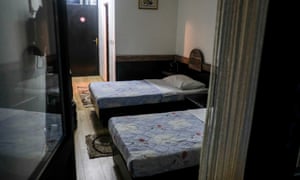
While the war was horrific enough, the peace that followed brought new torment for the victims of Vilina Vlas. Hotel business resumed at the squat, red-roofed building: the rape camp was returned to use for tourists without even a change of furniture – much less a memorial.
Višegrad town is now run by people apparently bent on not only forgetting the campaign of death that transformed their town from one with a Muslim majority to one heavily dominated by ethnic Serbs, but erasing any trace that any of it ever happened.
Despite pages of testimony at the international court in the Hague, and a judgment that confirmed it was used as a rape centre, Višegrad’s mayor, Mladen Djurevic, denies ever having heard of rape, torture, or murder at Vilina Vlas.
“I don’t know what happened there,” he said. “I am not interested in going back to the past. Why would I read about that if I’m not interested in going back to that?”
His offices suggest his disdain for history is selective. They sit at the heart of Andrićgrad, a tourist-trap pastiche of a traditional Serbian town, recently built in tribute to Višegrad’s most famous son, Nobel-prize winning author Ivo Andrić.
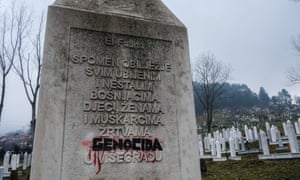
Previous administrations have poured millions of euros into building this memorial to an imagined past, while doing their best to destroy evidence, in some cases, of painful recent events. For years they have tried to demolish the ruins of a house where 59 Muslim civilians were burned alive, issuing demolition orders to make way for a superfluous drainage pipe and then a road to nowhere.
In the town’s Muslim graveyard, swollen by graves from 1992, authorities ordered the word “genocide” to be chiselled off a memorial to the dead, then sent in a team of workers to get rid of it. Survivors responded by painting it back in blunt, black letters so they stood out more dramatically.
And at Vilina Vlas, after blocking a memorial and ignoring calls for the hotel to be pulled down – or at least remodelled – the local government instead poured money into repaving the road to the hotel and starting work on an expansion to add a “luxury” floor.
“I personally don’t think we should demolish anything. We should refurbish and expand,” said Djurevic when asked about calls by some victims for the hotel to be pulled down. Dwelling on the past stopped a town from moving forward, he added.
One of the strongest voices against this official campaign of forgetting has been Hasečić, a survivor of both sexual violence and the ethnic cleansing campaign partly run from the spa.
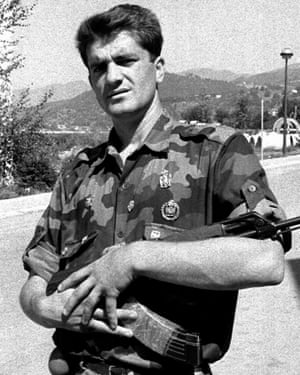
In 1992 she lived just a few miles down the road from the hotel and watched as it swallowed friends and neighbours. “No one knows exact numbers – we think around 200 women were taken through, based on testimony from survivors,” she said.
Word of the horrors began seeping out as a few of the men and women taken to Vilina Vlas – usually for murder and rape respectively – escaped or were rescued, often by Serb friends who managed to prise them away from their captors.
At least one girl who Hasečić knew, Jasmina Ahmetspahic, committed suicide by jumping from a balcony. Another was freed after the intervention of a Serbian friend but returned “her lips scratched, with a fever, shaking so much she couldn’t hold a cup of milk”.
Later, when she had escaped to relative safety, Hasečić began collecting more details about what had happened there. Much of it was confirmed as accurate years later in the trial of Lukić and his aides at The Hague, even though he was not charged with sexual violence.
“There was ample evidence about a large number of rapes, murder and other serious crimes being committed at the Vilina Vlas hotel,” said Dermot Groome, who led the prosecution of Lukić at The Hague, and is now a professor at Penn State Dickinson Law University, US.
Groome, a former sex-crime prosecutor in Manhattan, who also led the investigation of Slobodan Milosevic’s crimes in Bosnia, said the women tortured and abused at the hotel were “some of the most traumatised people I had ever encountered in my work as a prosecutor”.
None of them wanted to cooperate in a prosecution for sexual violence when initially contacted, because of their fears about appearing in court. However, the trial ended up hingeing on their testimony, as the rape survivors who had known Lukić in childhood played a critical role in dismantling his claim that he was not in Višegrad at the time of other attacks.
“To rebut his alibi, I needed to introduce a great deal of evidence of his sex crimes – evidence that would be sufficient to prove beyond reasonable doubt that he committed these rapes, and therefore was in Višegrad to commit the charged crimes,” Groome said.
Nerma Jelacic, a deputy director of the Commission for International Justice and Accountability, whose family is from Višegrad, said the aggressive refusal of the authorities in the town, and many of the ordinary Serbs who lived there, to even acknowledge these crimes was a fresh trauma for survivors, but also damaging to any longterm hopes of rebuilding.
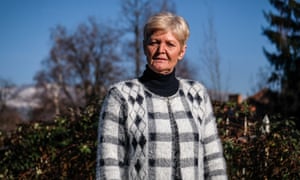
“You have whole generations who have been raised with this denial – this systematic denial of the undeniable,” she said. “This has become another way of waging a war.”
Tragedy mingles with hope on the streets of nearby Sarajevo, where there are constant reminders of past horrors – from the “Sarajevo roses” etched in the streets by mortar rounds to the museums about the war – but also a sense that people who were victims are rebuilding their lives.
But Višegrad feels much more sinister, a town where streets are still half-empty from the ethnic cleansing of 1992, while Serbs who benefited from it or moved in deny the reality around them. Djurevic was happy to lament Višegrad’s shrinking population, while at the same time ready to attack the campaigns to remember the bloody events that drove most Muslims away. “Until the early 1990s we had around 25,000 citizens, and currently the population is half of that,” he said.
In 1991 there were about 23,000 people living in Višegrad, two-thirds of them Muslim. The most recent 2013 census found the population had fallen to less than half that, and barely 10% of them are Muslims.
Among the few who have come back is Bilal Memišević, who left a well-paid job in Dubai to grapple with the complex politics of Višegrad. He survived because he was studying abroad in 1992, but his parents were killed; he says he came home to honour their memory.
“My parents paid the highest possible price for Višegrad, so I had a moral obligation to go back and continue our family line, on our family land – and I succeeded in that,” he said.
Now he farms and breeds horses and is the only Muslim member of the municipal assembly. But he wishes more Muslim people would join him. “We have a problem that there are very few of us,” he said.
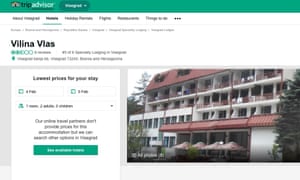
He considers Vilina Vlas a “terrible kind of place” and was part of a civil society initiative to have a commemorative plaque put on the building. “You could prevent a future crime by telling about the terrible things that happened,” he says. But he doesn’t want the building torn down.
Historic hammams, or bathhouses, in the hotel grounds dated back to Ottoman times and had never been used for murder, he said. And the hotel was important to the town’s economy, employing about 70 people.
“I deal with the past in a certain way, because I want people who come back to Višegrad to have a future,” he says. “Rationally, you can’t blame buildings. It’s the ideology that needs to be changed. If you say we have to destroy the spa, by that logic you have to destroy half of Bosnia.”

